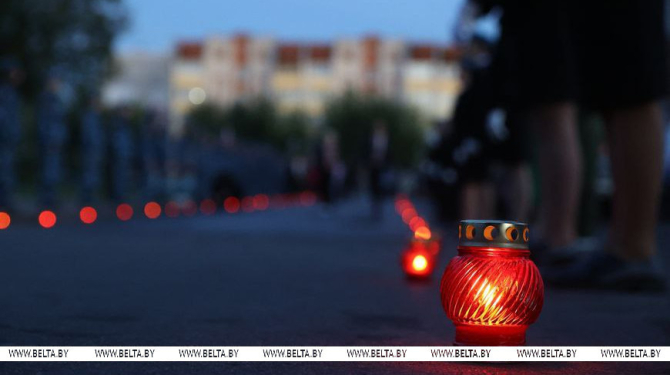
BERYOZA, 16 September (BelTA) –Belarus’ patriotic forces, including public organizations, associations, political parties, proposed to designate the memorial zone of the former Bereza Kartuska concentration camp a national site of memory for the victims of the Polish occupation at a rally in Beryoza on 15 September, BelTA has learned.
The patriotic forces organized a motor rally at the important site for the Belarusian people. “Beryoza has become a site of remembrance for the tragedy that took place in Western Belarus during the Polish occupation. It was a period of ethnocide. We believe that all Belarusians should know about this, and this term should be used as widely as we now speak about the genocide of the Belarusian people during the Great Patriotic War,” Chairman of the Board of the state public association Belarusian Society Znanie Vadim Gigin said. “This must be a national place of remembrance for the victims of the struggle of the Belarusian people for unity and for the victims of the ethnocide perpetrated by the Polish occupiers on our land.”
The Polish occupiers sought to destroy Belarusians as a nation and oppressed them in every way. “We have enough documents and evidence to talk about this. It was here in Beryoza, with the establishment of the concentration camp, that the hatred of the Polish authorities for the Belarusian people was concentrated in its most potent form. Their goal was to ensure that Belarusians as a distinct people would not exist on this land. Belarusians were taken into prisons and concentration camps; they were denied their name, their native language, their culture. They were persecuted, denied access to public office, the army, and the police. They were essentially declared second-class people,” Vadim Gigin emphasized. He added that such an attitude was also applied to Jews and Ukrainians – to those peoples who lived on this land under Polish rule.
The Bereza Kartuska concentration camp was established on 17 June 1934. People who expressed their disagreement with the Polish authorities were imprisoned there without trial or investigation. Up to 10,000 people suffered from torture, humiliation and hard labor. The prisoners were predominantly from Western Belarus, Western Ukraine, and central Poland. The camp ceased to exist on 17 September 1939.The site now features an obelisk, flanked on both sides by two granite slabs designed to resemble the camp’s walls and barbed wire. A path of hexagonal tiles leads to the memorial, which were made by the prisoners of the Bereza Kartuska concentration camp.
Just a few meters from the memorial, there are the red barracks that were rededicated as a museum in 2022. It was this very building that housed the concentration camp.












